
One World Education, Washington, DC, serves 5000 middle school, high school,
and adult learners at 20 schools annually as the city’s largest writing program.
We improve critical thinking and writing skills – the two most important skills students need for college and life.
One World Education serves 5,000 Washington, DC middle school, high school, and adult learners at 20 schools annually as the city’s largest writing program. We improve critical thinking and writing skills – the two most important skills students need for college and life. In the fall, we provide teachers with stellar professional development, curriculum, and evaluation. Teachers then deliver the eight-week program to students. In the spring, we provide select students with the chance to train with us and to present their work while competing for scholarships in a citywide competition in front of 300 community leaders, educators, and family members. www.oneworldeducation.org
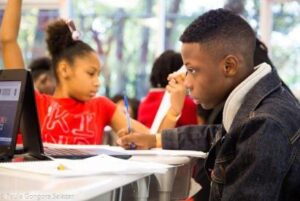
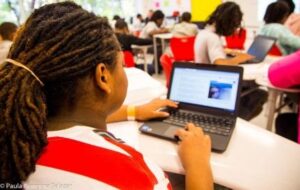
Vision
One World Education’s mission is to transform students into writers with voice, knowledge, and purpose. Our vision is for all students to be excellent writers and communicators. Our programs improve critical thinking and writing skills – the two most important skills students need for college and life.
Need
One World’s programming addresses a persistent weakness in American middle and high schools. Few teachers are trained to be effective writing instructors. Only a third of DC students graduate high school ready for college writing. The problem is particularly acute for the city’s students of color. While 88% of white students are graduating as college-ready writers, only 28% of African American students are. In our 140-character world, students need, more than ever, to learn to write logically, succinctly, and eloquently. Current failures cost billions of dollars in remediation annually for colleges and American companie
History
One World started in Southeast DC among some of the city’s lowest income students at the SEED Public Charter School in 2007 in the classroom of one teacher frustrated by their poor writing. This led to a new approach where students were given the responsibility to choose their own topics, social justice issues relevant to their own lives. Eric Goldstein, the teacher and founder of One World, taught his students how to turn their thoughts into well-organized essays backed by hard evidence.
Goldstein and another teacher developed the entire One World Education curriculum for teaching the writing process. It begins with students choosing their own topics. The curriculum then guides students through a rigorous step-by step process of “evaluating sources, creating a bibliography, and writing a research paper, developing research, critical thinking, public speaking, and active listening skills along the way.”
One World received funding from several philanthropies. Twelve years later, what started as a writing project in one classroom is now the largest writing program in D.C. schools.
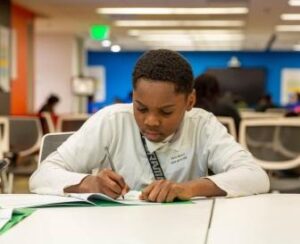 One World runs two complementary programs for middle school, high school, and adult learners. The One World Program, takes place over two months in the fall in 20 DC schools, serving 5,0000 students annually. The program is delivered by teachers at partner schools who receive training and ongoing support from One World staff.
One World runs two complementary programs for middle school, high school, and adult learners. The One World Program, takes place over two months in the fall in 20 DC schools, serving 5,0000 students annually. The program is delivered by teachers at partner schools who receive training and ongoing support from One World staff.
Activities
Students
Students are guided through an eight-week learning experience where they:
-
- Choose their own social justice issue. They connect credible research to their own ideas for solutions to real-world problems. Engagement soars when they write about issues directly relevant to their own lives.
Grade 5/6 – School Issues Examples: Bullying, Parental Involvement, School Lunches, The Value of Homework, School Safety, Technology in Schools, Recess
- Choose their own social justice issue. They connect credible research to their own ideas for solutions to real-world problems. Engagement soars when they write about issues directly relevant to their own lives.
Grade 7/8 – National & Civic Issues Examples: Immigration, Police in the Community,
Minimum Wage, Voting Rights, Environmental Protection, Solutions for Poverty
Grade 9/10 – Cultural & Global Issues Examples: Refugees, Curfews, Gun Control, Climate Change, Cyberbullying, Teenage Pregnancy, Standardized Testing, Death Penalty
Grade 11/12 – College & Career Issues Examples: College Athletes, Historically Black Colleges & Universities (HBCU), Gap Year, Careers in Environmental Science, Women in STEM Careers, Racial Equality and Employment, Student Loan Repayment, Affirmative Action in Education
-
- Complete ten lessons in bound journals that provide extensive scaffolding to master each element of the writing process. An intimidating assignment (writing an essay) becomes a series of small manageable steps.
These units span 6-8 weeks, contain 10 lesson plans, address approximately 20-25 Common Core State Standards, and are designed to prepare students for assessments like PARCC. Specific standards are addressed at each grade level. All lessons contain clear and measurable objectives, exercises, and assessments.
- Complete ten lessons in bound journals that provide extensive scaffolding to master each element of the writing process. An intimidating assignment (writing an essay) becomes a series of small manageable steps.
Each One World Unit is divided into four core stages:
Stage 1: Student Exemplar Analysis
Students are introduced to the foundation, uses, and vocabulary of the problem-solution approach to argumentative writing through an analysis of a student exemplar that revolves around a cultural and global issue. By the end of stage one, students have explored various issues through the lens of argumentative writing and are ready to select their research topic.
Stage 2: Research
Students begin this stage by writing a personal narrative about the issue they have chosen and practice identifying quality sources and evidence in PARCC-style assessments. Then, they construct research questions to create a plan of action for in-depth research and source analysis. Resources at varying reading levels have been selected and are available on the One World Education Research Portal. We encourage teachers to plan this stage in advance of the lessons to reserve computer lab time or provide additional materials.
“Your personal experiences and observations are critical to forming ideas and deeper understanding, but you also need evidence to support your claims. The One World Research Portal is a database of vetted sources where you can generate this evidence Each topic link leads to a list of articles from our content partners with descriptions.”
Is there a topic you are interested in that isn’t listed below? Let us know what topics you would like to see on our Research Portal by filling out our quick Suggestion Form!”
Stage 3: Writing
Students are guided through the process of selecting the best evidence to support their claim, organizing their research into an outline, and transferring their conclusions into a draft of their essay. They then provide and receive peer feedback and engage in revision toward a final draft.
Stage 4: Presentation
Once the final essays are completed, students present their information to the class or in smaller peer groups. Teachers select student writing for submission to the One World Education Team for publishing consideration.
-
- Student Resources The program offers every student a journal in which they demonstrate their skills through exercises and assessments. Students also access a Research Portal, an online database of vetted sources where they generate evidence for their arguments.
- Sharing of Student Writing :One World Education believes that students should write to be read, in addition to earning a grade. Once students complete the program, we select and publish about 1% of the exemplary writing of students who complete the One World Program to model grade-level writing and to create a forum for peer-to-peer learning.
*Samples of student writing are below.
-
- One World Challenge
The organization’s second program prepares select students from the in-school program for a citywide competition/showcase, the One World Challenge. For two months in the winter and spring, these students meet weekly in an afterschool One World Academy to sharpen their writing and to turn their stellar essays into compelling oral presentations. The Academy is hosted at UNCF and run by One World staff, teachers, and volunteer mentors. The culminating event is the One World Challenge, where students present to 300 community leaders, educators, and family members. A dozen winners split $10,000 in scholarships and academic prizes in one of the city’s premier education events.
- One World Challenge
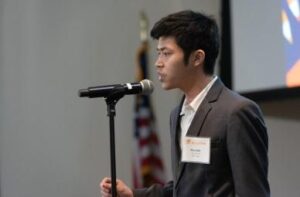
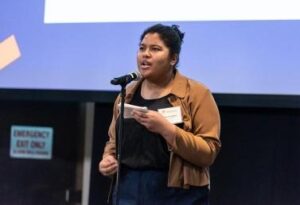
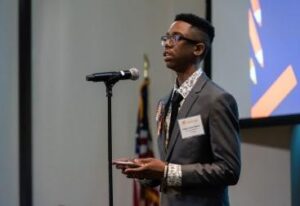
Teachers
- Professional Development: Teachers experience the program as students and learn to differentiate the program to meet the needs of all learners. Before the pandemic, One World provided in-person training at several centralized sites throughout the city during afternoons right before the start of the school year. With the pandemic, One World will be providing both synchronous and asynchronous sessions to train teachers on using the program.
- Teacher Curriculum
Every teacher receives access to a digital Curriculum Guide with 10 lessons that cover the program’s four stages. Each unit addresses between 20-25 Common Core State Standards. Read more here. These units span 4-8 weeks, contain 10 lesson plans, address approximately 20-25 Common Core State Standards, and are designed to prepare students for assessments like PARCC. All lessons contain clear and measurable objectives, exercises, and assessments.
The curriculum includes four grade-level One World Units, each with a specific, age-appropriate theme:
-
- Grade 5/6 – School Issues
- Grade 7/8 – National & Civic Issues
- Grade 9/10 – Cultural & Global Issues
- Grade 11/12 – College & Career Issues
- Grade 5/6 – School Issues
Teachers are also offered:
-
- Planning support One World staff are available to meet with teachers and administrators to help them integrate One World’s program with their overall school curriculum.
- Coaching One World staff are available to observe teachers’ delivering One World lessons and to provide feedback.
- Direct support for students experiencing difficulty getting started. One World’s Manager for Student Success frequently visits classrooms (pre-pandemic and once schools fully re-open) and both encourages students to participate in One World’s springtime Academy and Challenge while also being available to work one-on-one with students who the teacher has identified as needing extra support.
* Samples of Student Writing
Mental Health in the Black Community by MIKEL POOLE, Ambassador Class: 2019, Grade10 Mikel’s argument is that providing the black community with access to the medicine and support they need will help normalize the topic so people can talk about it and stop the generational neglect of black people’s mental health and well-being.

Women’s Inequality by AMYAH FOSTER, Ambassador Class: 2019, Grade 6 In her essay, Amyah argues that women do not receive equal pay due to both gender and racial discrimination. She does not want her future compromised and feels that women need to speak out and that the government needs to implement some changes.

More Than A Statistic by CADEN TURNER-ADAMS, Ambassador Class: 2019, Grade 10 In his essay, Caden argues that there are plenty of children in the world who want to learn, but don’t have the opportunity. Education is a gateway for them to see and experience the world in new ways and providing it to all kids will help society be equipped to deal with other crucial global issues.

Suspension Bias by NYLA THOMAS, Ambassador Class: 2019, Grade 7 Nyla argues that minorities in America are disproportionately disciplined in school and how this affects students in a negative way that can lead to isolation, students being disengaged in class, students being pushed out of school, and engaging in criminal behavior.

LGBTQ Bullying by NICOLE PENDERGAST, Ambassador Class: 2019, Grade 10
Nicole claims that LGBTQ bullying at schools can be counteracted, and schools made safer, by protecting youth privacy, not disclosing any of students’ important information, and creating Gay-Straight Alliances.

The Struggle to Keep Abortion Legal by MINA SWAMINATHAN, Ambassador Class: 2017, Grade 10 In her essay, Mina argues why she believes it should become a legislative priority to serve and protect pro-choice laws. The current pro-choice laws should not be revoked because abortion laws are safe and save unwanted children and unprepare parents from grim life prospects.

Let Me Learn by EMELDA NYAJOK, Ambassador Class: 2017, Grade 10
In her essay, Emelda argues that a basic human right is the right to an education. She looks at why there are over 60 million girls unable to attend school worldwide and what needs to be done to correct this and improve the livelihoods of even more.

Successful Impact
Academically, One World gets statistically significant gains because students learn skills like how to:
-
- think critically and develop cogent arguments
- identify problems
- develop solutions
- create hooks
- build a research plan
- use evidence
- outline
- write with clarity
- revise
The Library of Congress honored One World for its best practices in literacy last year. We were featured in a Washington Post column after our last National Housing Center showcase event. The organization was a DC Mayor’s Award finalist in 2018. We are particularly proud of our signature quantitative evaluation in 2017 by the World Bank that showed that 90% of schools using the program made statistically significant gains in research and writing skills. Over the past dozen years, One World has worked with more than 40,000 DC students and 1,000 DC teachers, making a significant impact on their lives. Their moms see it too!
One World’s Evaluation Processes
Every unit contains pre- and post-assessments that evaluate skills to measure student growth.
We have used independent, highly regarded institutions to develop and implement the evaluation of the One World Program to demonstrate its quantitative and qualitative impact with students, teachers, and schools. We measure quantitative impact by assessing the level of student skills before and after using the program. Our evaluation partner institutions, American University and the World Bank, developed pre- and post-program assessments to measure skills aligned to four Common Core State Standards for writing that are the foundation of most high school and college-level essay assignments. These standards are also assessed on the PARCC exam and include:
-
- Making a claim/counterclaim (W.1a)
- Supplying evidence for claims and counterclaims (W.1b)
- Creating cohesion between claims and reasons (W.1c)
- Providing a concluding statement (W.1e)
Our staff administer the evaluation, and professors at American University and DC teachers grade them according to a rubric. We then analyze these results to assess their impact, following protocols developed by a World Bank economist who conducted the analyses independently from 2015-2017 as part of his volunteer work for the Rotary Club of Capitol Hill. He found that 90% of the schools using the program made statistically significant gains. The 2015-2017 schools had nearly identical demographic profiles to the schools we are proposing to serve with this application.
What’s more difficult to quantify but easy to observe is how the program gives students voice, builds knowledge, develops critical thinking, and gives them a sense of purpose. These transformations are best demonstrated through the stories of individual students.
Ben Acquah participated in the One World Program five years ago and has come back every year since to mentor other students because of how it changed his life.
The quantitative successes found in the World Bank data are matched by qualitative data from teacher surveys. In the most recent surveys of One World professional development with DC charter schools in August 2019, 100% of the 30 teachers surveyed reported that the professional development was a valuable use of their time, 95% said the program would bring rigor and relevance to their students, and 80% felt sure that the program would engage their students.
Recommendations for replication and/or adaptation
One World’s Program is available for replication. Professional development is essential to its successful delivery and is available to schools in the weeks before school begins. Training takes two hours and can be completed in one afternoon. (See above) The program is flexible and has been used in many ways.
-
- Implementation of the model can be varied according to the needs of a district, school, or classroom. Most teachers take 6-8 weeks to complete the program, but some teachers use the program every day while others teach it once a week.
- Teachers have used the One World Program in English, Social Studies, and elective classes.
- Schools participating in One World often leverage their success with the program to build celebration and community. We recommend sharing students’ work by publishing their writing and holding assemblies where they can present their work.
After a dozen years of serving DC schools with a paper-based program – before the 2020 virus pandemic – One World now is working urgently to prepare the tools it needs to be ready for 100% remote learning in the fall. We expect to be able to use these same tools to begin providing our program to schools around the country during the 2021-22 school year.
Contact
www.oneworldeducation.org
Megan Linehan, Director of Curriculum and Instruction
(716) 870-3207
megan@oneworldeducation.org
